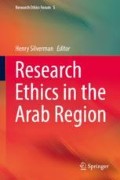Abstract
In the last decade health research, including international clinical trials, has increased greatly in the Arab region. However, commentators have voiced concerns that many RECs in this region might not be able to promote high standards of human subject protection due to several challenges that they face. These challenges include the lack of an enabling legal framework at the national level, inadequate institutional support that includes appropriate human and capital resources, insufficient training of members to review studies, inadequate membership diversity, lack of transparency and accountability mechanisms, absence of internal quality improvement programs, and 1lack of assessment mechanisms. We offer several solutions to address these challenges.
References
Abdel-Aal, W., E.A. Ghaffar, and O. El Shabrawy. 2013. Review of the Medical Research Ethics Committee (MREC), National Research Center of Egypt, 2003–2011. Current Medical Research and Opinion 29 (10): 1411–1417. https://doi.org/10.1185/03007995.2013.815158.
Association for the Accreditation of Human Research Protection Programs (AAHRPP). 2015. Available at: http://www.aahrpp.org
Council for International Organizations of Medical Sciences (CIOMS), and World Health Organization (WHO). 2016. International ethical guidelines for health-related research involving humans. Geneva: CIOMS.
Egyptian Network of Research Ethics Committees (ENREC). 2015. Available at: www.enrec.org.
Hyder, A.A., S.A. Wali, A.N. Khan, N.B. Teoh, N.E. Kass, and L. Dawson. 2004. Ethical review of health research: A perspective from developing country researchers. Journal of Medical Ethics 38: 68–72.
Kass, N., L. Dawson, and N.I. Loyo-Berrios. 2003. Ethical oversight of research in developing countries. IRB: Ethics & Human Research 25: 1–10.
Matar, A., and H. Silverman. 2013. Perspectives of Egyptian research ethics committees regarding their effective functioning. Journal of Empirical Research on Human Research Ethics 8 (1): 32–44. https://doi.org/10.1525/jer.2013.8.1.32.
Milford, C., D. Wassenaar, and C. Slack. 2006. Resources and needs of research ethics committees in Africa: Preparations for HIV vaccine trials. IRB: Ethics & Human Research 28: 1–9.
Moodley, K., and L. Myer. 2007. Health research ethics committees in South Africa 12 years into democracy. BMC Medical Ethics 8: 1. https://doi.org/10.1186/1472-6939-8-1.
Office of Human Research Protections (OHRP). 2015. IRBs and assurances. Available at: http://www.hhs.gov/ohrp/assurances/index.html.
Silaigwana, B., and D. Wassenaar. 2015. Biomedical research ethics committees in sub-Saharan Africa: A collective review of their structure, functioning, and outcomes. Journal of Empirical Research on Human Research Ethics 10 (2): 169–184. https://doi.org/10.1177/1556264615575511.
Silverman, H., H. Sleem, K. Moodley, N. Kumar, S. Naidoo, T. Subramanian,. .. M. Moni 2015. Results of a self-assessment tool to assess the operational characteristics of research ethics committees in low- and middle-income countries. Journal of Medical Ethics 41(4): 332–337. doi:10.1136/medethics-2013-101587.
Sleem, H., S. El-Kamary, and H.J. Silverman. 2010a. Identifying structures, processes, resources and needs of research ethics committees in Egypt. BMC Medical Ethics 11: 12.
Sleem, H., R.A. Abdelhai, I. Al-Abdallat, M. Al-Naif, H.M. Gabr, E. T. Kehil, . .. H. Silverman. 2010b. Development of an accessible self-assessment tool for research ethics committees in developing countries. Journal of Empirical Research Human Reseach Ethics 5(3): 85–96; quiz 97–88. doi:10.1525/jer.2010.5.3.85.
Strategic Initiative for Developing Capacity in Ethical Review (SIDCER). 2015. SIDCER recognition programme: Available at: http://www.who.int/sidcer/en/
World Medical Association. 2013. Declaration of Helsinki. Available at: http://www.wma.net/en/30publications/10policies/b3/
Younis, I.M. 2015. Overview of research committees status in Egypt: Challenges aspirations and current situation. Accountability in Research 22 (4): 222–236. https://doi.org/10.1080/08989621.2014.956869.
Author information
Authors and Affiliations
Corresponding author
Editor information
Editors and Affiliations
Rights and permissions
Copyright information
© 2017 Springer International Publishing AG
About this chapter
Cite this chapter
Sleem, H.M., Silverman, H. (2017). Challenges of Research Ethics Committees in the Arab Region. In: Silverman, H. (eds) Research Ethics in the Arab Region. Research Ethics Forum, vol 5. Springer, Cham. https://doi.org/10.1007/978-3-319-65266-5_27
Download citation
DOI: https://doi.org/10.1007/978-3-319-65266-5_27
Published:
Publisher Name: Springer, Cham
Print ISBN: 978-3-319-65264-1
Online ISBN: 978-3-319-65266-5
eBook Packages: Religion and PhilosophyPhilosophy and Religion (R0)

